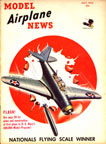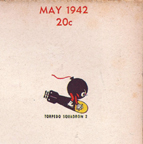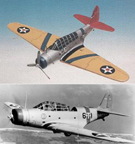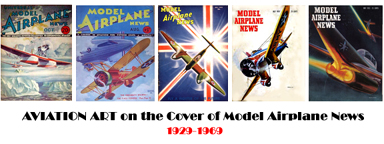May, 1934

Douglas TBD "Devastator"
Model Airplane News Cover Art for May, 1934
by Jo Kotula
Click to Enlarge
The TBD marked a large number of "firsts" for the U.S. Navy. It was the first widely-used carrier-based monoplane as well as the first all-metal naval aircraft, the first with a totally enclosed cockpit, the first with hydraulically folding wings. A semi-retractable undercarriage was fitted, with the wheels designed to protrude 10 in below the wings to permit a "wheels-up" landing with only minimal damage. It was "revolutionary" for the mid-1930s

Douglas TBD Devastator
in Popular Mechanics May, 1938
Click to Enlarge
The U.S. Navy assigned popular names to its aircraft in late 1941, and the TBD became the "Devastator".
If you take a look at the May, 1942 cover, you'll find a small emblem in the upper right hand corner just below the date. This is artist Jo Kotula's tribute to Torpedo Squadron Two (VT-2) aboard the aircraft carrier USS Lexington. Below, you'll find an enlargement of his cover art and a photo of some actual VT-2 patches.


Tribute to VT-2 Torpedo Squadron
On the USS Lexington
Cannonball and Torpedo
Sadly, most of this squadron was lost in the Battle of Midway
Click to Enlarge
A crew of three was normally carried beneath a large "greenhouse" canopy almost half the length of the aircraft. The pilot sat up front; a rear gunner/radio operator took the rearmost seat, while the bombardier occupied the middle seat. During a bombing run, the bombardier lay prone, sliding into position under the pilot to sight through a window in the bottom of the fuselage, using the Norden Bombsight. The offensive armament that he targeted would be either a single Bliss-Leavitt Mark 13 aerial torpedo or a single 1,000 lb bomb. Defensive armament consisted of either a .30 caliber or .50 caliber machine gun firing forwards, and a .30 caliber machine gun for the rear gunner.

Douglas TBD "Devastator"
Click to Enlarge
A total of 129 were purchased to equip the carriers USS Saratoga, USS Enterprise, USS Lexington, USS Wasp, USS Hornet, USS Yorktown and USS Ranger.The U.S. Navy became aware by about 1940 that the TBD had become outclassed by the fighters and bombers of other nations and a replacement (the TBF Avenger, see
Once revolutionary, the Devastator had become a death trap for its crews: slow and poorly maneuverable, with light defensive weaponry and poor armour relative to the weapons of the time. Its speed on a glide-bombing approach was a mere 200 mph making it easy prey for fighters and defensive guns alike. The aerial torpedo could not even be released at speeds above 115 mph. Three entire squadrons of TBD were lost during the Battle of Midway without scoring a single hit.
Here is a video of the Douglas TBD "Devastator" in action:
Click Here for more information about the Douglas TBD "Devastator".

Click to go back and select another cover.
Counter for the Entire Site (not just this page..)
Home | About Lindy | Last Week's Reviews | Upcoming Events | 1940s Collecibles
The Guide - Establishments - Travel - Accessories
Music | Links | Photo Gallery | Extras | Contact